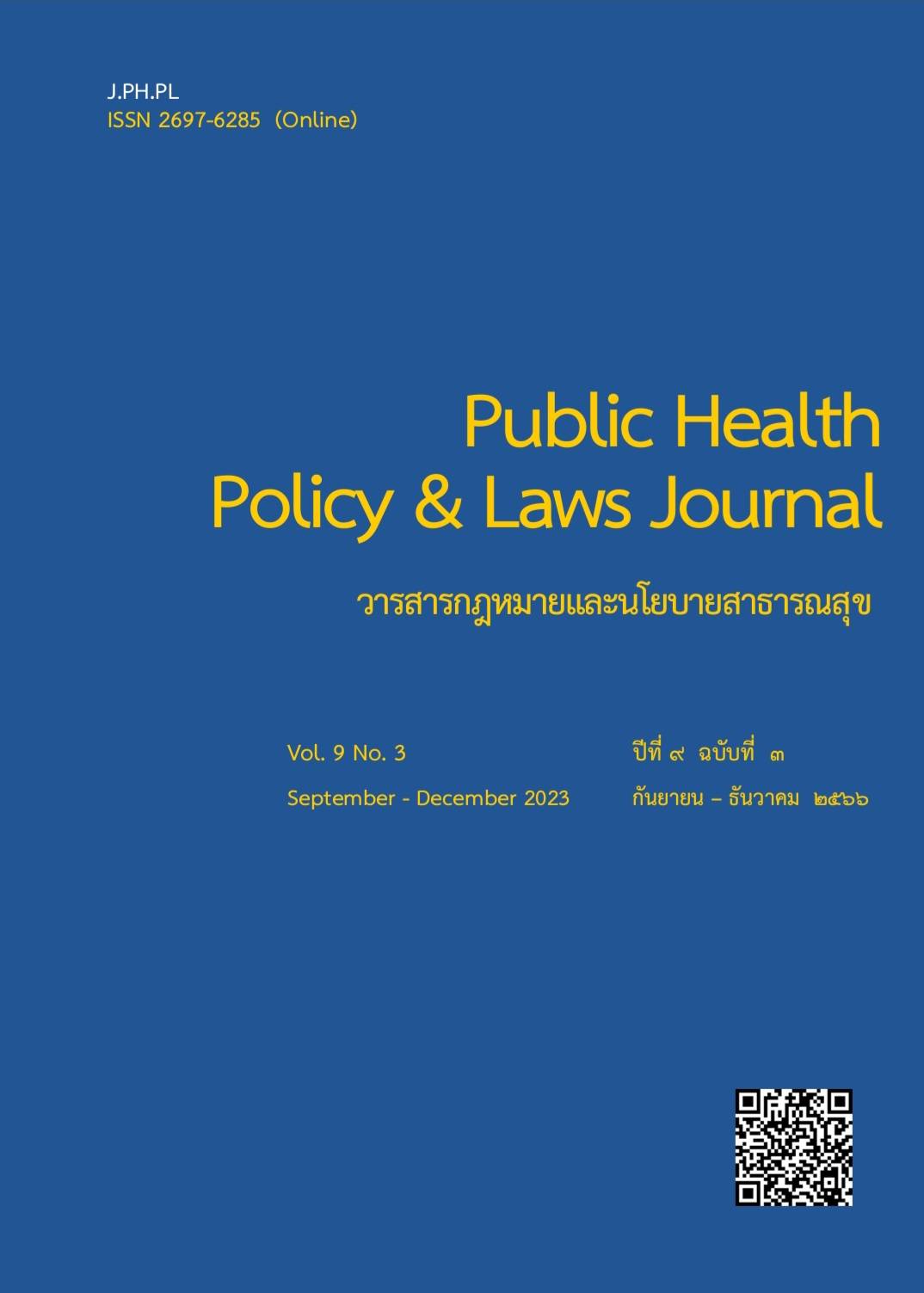การวิเคราะห์องค์ประกอบความเป็นนวัตกรทางสุขภาพ ของนักศึกษาระดับปริญญาตรี วิทยาลัยการสาธารณสุขสิรินธร จังหวัดตรัง คณะสาธารณสุขศาสตร์และสหเวชศาสตร์ สถาบันพระบรมราชชนก
คำสำคัญ:
การวิเคราะห์องค์ประกอบ, ความเป็นนวัตกรทางสุขภาพ, นักศึกษาระดับปริญญาตรี, สถาบันพระบรมราชชนกบทคัดย่อ
การศึกษาครั้งนี้มีรูปแบบการวิจัยผสมวิธี ตามวัตถุประสงค์ของการวิจัยเพื่อ 1.ศึกษาองค์ประกอบความเป็นนวัตกรทางสุขภาพ ของนักศึกษาระดับปริญญาตรี 2. ตรวจสอบความเที่ยงตรงตามสภาพจริงขององค์ประกอบความเป็นนวัตกรทางสุขภาพ ของนักศึกษาระดับปริญญาตรี โดยตัวแปรที่ต้องการวิเคราะห์หรือตัวแปรที่สังเกตได้ จำนวน 38 ตัวแปร กำหนดขนาดกลุ่มตัวอย่าง 7 เท่า ดังนั้นได้ขนาดกลุ่มตัวอย่างจำนวนทั้งสิ้น 266 คน เลือกกลุ่มตัวอย่างโดยการสุ่มแบบหลายขั้นตอน เครื่องมือที่ใช้เป็นแบบสอบถามที่ผ่านการตรวจสอบความเที่ยงตรงจากผู้ทรงคุณวุฒิ 7 คน มีค่าดัชนีความเที่ยงตรงตามเนื้อหาทั้งฉบับ เท่ากับ 1.00 และมีค่าความเชื่อมั่นเท่ากับ 0.93 การวิเคราะห์ข้อมูลด้วยเทคนิคการวิเคราะห์องค์ประกอบเชิงสำรวจ สกัดปัจจัยด้วยวิธีวิเคราะห์องค์ประกอบหลักและหมุนแกนองค์ประกอบแบบออโธโกนอลด้วยวิธีแวริแมกซ์ ส่วนการตรวจสอบความเที่ยงตรงตามสภาพจริงกับกลุ่มผู้รู้แจ้งชัดตามคุณสมบัติจำนวน 30 คน เพื่อยืนยันองค์ประกอบและตัวบ่งชี้ตามข้อค้นพบจากงานวิจัย
ผลการศึกษาพบว่า เมื่อนำมาวิเคราะห์องค์ประกอบเชิงสำรวจ มีจำนวนทั้งสิ้น 4 องค์ประกอบ 29 ตัวบ่งชี้ ดังนี้ 1) กรอบความคิดแบบเติบโต จํานวน 8 ตัวบ่งชี้ 2) ความรอบรู้ด้านเทคโนโลยีและสุขภาพ จํานวน 7 ตัวบ่งชี้ 3) การสื่อสารอย่างมืออาชีพ จํานวน 8 ตัวบ่งชี้ และ 4) การเรียนรู้ตลอดชีวิต จํานวน 6 ตัวบ่งชี้ ส่วนการตรวจสอบความเที่ยงตรงตามสภาพจริงของตัวบ่งชี้ทุกตัวมีความเที่ยงตรงตามสภาพ อย่างมีนัยสำคัญทางสถิติที่ระดับ .001
เอกสารอ้างอิง
Akkadechanunt, T. (2019). Nurses’ Competency and Public Healthcare Innovations in Thailand 4.0 Era. Thai Journal of Nursing Council, 34(1), 5-13.
Berkman, N.D., Davis, T.C. and McCormack, L. (2010) Health Literacy: What Is It? Journal of Health Communication, 15, 9-19.
Hair, J.F., Black, W.C., Babin, B.J. & Anderson, R.E. (2010). Multivariate Data Analysis (7th ed.). New York: Pearson.
Kaewyotha, J., Chonlathep, P., Kaewkaen, L., Pollarp, T., & Chamwiset, A. (2022). Teacher’s growth mindset in school under the Office of Udonthani Primary Educational Service Area 1. Academy Journal of Northern, 9(4), 36-49.
Kay, K., & Greenhill, V. (2011). Twenty-first century students need 21st century skills. In G. Wan, & D. M. Gut (Eds.), Bringing schools into the 21st century (pp. 41-65). New York: Springer, Dordrecht.
Ketkosan, N., Boonchauythanasit, K., & Prabpai, S. (2021). Factors and Indicators of Learning Design Competency of Pre-Service Health Education Teachers to Promote Students’ Health Literacy. Kasetsart Educational Review, 36(3).
Ketsingh, W. (1995). Action research. Bangkok: Thai Watthana Panich.
Klaichun, P., & Trirat, P. (2021). A model for promoting innovation for bachelor's degree programs in private universities in Thailand. Journal of Social Science and Buddhistic Anthropology, 6(8), 236-252.
Kruthangka, P., Kruthangka, K., Raimaturapong, J., & Boonpiamsak, T. (2022). The Comparison of the Digital Literacy of Registered Nurses in a Government Hospital in Samutprakan Province. Thai Red Cross Nursing Journal, 15(2), 251-265.
Meenongwah, J., Sarakarn, K., & Kotta, P. (2021). Strategies of Instructors’ Potential Development in Innovative Learning Method for Nursing Students at Boromarajonani College of Nursing Sanpasithiprasong. Journal of MCU Peace Studies, 9(3), 1130-1143.
Nuansri, M., & Pantuworakul, K. (2022). The Analysis of Digital Competency for Student Teachers at Rajabhat University. Journal of Humanities and Social Sciences Thonburi University, 16(3), 37-47.
Nungalee, M., & Wijitwanna, S. (2023). Promoting Students’ Creating Innovators of the Sub-District Quality Schools under the Secondary Educational Service Area Office Bangkok 1. Journal of Humanities and Social Sciences, Rajapruk University, 9(1), 240-253.
Phitthayasenee, M., & Rueangrong, P. (2021). Guidelines for promoting innovator characteristics of teacher students. Lampang Rajabhat University, 10(2), 80-92.
Piyarungsi, K., Swathanan, S., Inthanan, N., & Hanwong, U. (2022). Attributes of Young Innovators. Journal of Liberal Arts, Thammasat University, 22(2), 438-458.
Praphainthara, P. (2020). The Best Practice of Creating and Developing an Innovative Prototype in Health. Thai Journal of Public Health and Health Sciences; TJPHS, 3(3), 132-142.
Srisa-at, B. (2010). Research in measurement and evaluation. Bangkok: Suviriyasan.
Sunthonnon, T., & Chaitiang, N. (2023). Strategic Management for the Development of Public Health Organizations in the VUCA World by Techniques of 3 Knows. Public Health Policy and Laws Journal, 9(2), 323-337.
Sutthijakra, S. (2019). Nurturing Undergraduates’ Innovation Skills in Creative Faculties in Thailand. Journal of EducationStudies, 47(1), 487-507.
Suwanasaeng, N., Yingyoud, P., & Khwansatapornkoon, K. (2019). Application of the Growth Mindset to Registered Nurses’ Professional Development in the Thailand 4.0 Reformation. Thai Journal of Nursing Council, 34(3), 5-14.
ThanyaratSrisakul, A. (2019). Health Innovation. Journal of Health Research and Innovation, 1(1), 58-64.
Tribunnithi, K. (2021). Development of training curriculum to enhance innovative thinking skills for industrial teacher students. RMUTSB ACADEMIC JOURNAL (HUMANITIES AND SOCIAL SCIENCES), 6(2), 238-247.
Wongprasert, L., e Boonkoum, W., Kheovicha, K., & . s Paiwitthayasiritham, C. (2020). Innovative Enterpreneurs Characteristics of Vocational Students in Thailand 4.0. Integrated Social Science Journal, 7(2), 17-32.
ดาวน์โหลด
เผยแพร่แล้ว
รูปแบบการอ้างอิง
ฉบับ
ประเภทบทความ
สัญญาอนุญาต
Disclaimer and Copyright Notice
เนื้อหาและข้อมูลในบทความที่ลงตีพิมพ์ในวารสารกฎหมายและนโยบายสาธารณสุข ถือเป็นข้อคิดเห็นและความรับผิดชอบของผู้เขียนบทความโดยตรงซึ่งกองบรรณาธิการวารสาร ไม่จำเป็นต้องเห็นด้วย หรือร่วมรับผิดชอบใด ๆ
บทความ ข้อมูล เนื้อหา รูปภาพ ฯลฯ ที่ได้รับการตีพิมพ์ในวารสารกฎหมายและนโยบายสาธารณสุข ถือเป็นลิขสิทธิ์ของวารสารฯ หากบุคคลหรือหน่วยงานใดต้องการนำทั้งหมดหรือส่วนหนึ่งส่วนใดไปเผยแพร่ต่อหรือเพื่อกระทำการใด ๆ จะต้องอ้างอิงเสมอ





